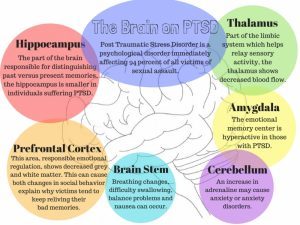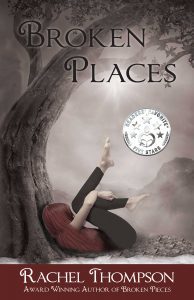This Is What Abuse Survivors Can Learn From Triggers
It was an ordinary exam. Something I’d experienced goodness knows how many times before, considering I’m in my fifties and have had two children. Something you learn just being a woman and especially after having children: your private parts aren’t really private. The medical staff is all up in there, checking this and that. And you learn, as a woman, that that’s just how it is. They’re doing their job.
For most women, these types of yearly exams run from mildly annoying to just get it over with – regardless, it’s something we have to do. For some who are shy, it’s embarrassing, yet they get through it. For others who are pretty comfortable with their bodies and sexuality, no big deal.
As a survivor of childhood sexual abuse, I’ve learned to mentally prep myself: I’ve had babies. All manner of medical staff have been up in my girlie parts. So my prep is: deal with it.
Minimizing and dismissing my own discomfort is my go-to. It’s how I push through.
So, when I recently had to have a vaginal ultrasound (welcome to menopause!), I did my usual prep: just get through it. I wasn’t prepared, however, for how uncomfortable it would be. I didn’t prep for the pain. Don’t get me wrong: the pain wasn’t unbearable, and the tech was as gentle as she could be. In fact, she kept apologizing, “I’m so sorry! I’m so sorry!” When I asked her ‘How many times a day do you say that?’ she chuckled. “About a thousand.” Poor thing. What a job, man.
I didn’t dissociate during the exam. I used my deep breathing. I used my mantras (You are safe. You are good. You are loved.) to help me focus. I didn’t freak out at all. In other words, I coped.
And I was fine. I’m always fine. Til I got in my car and began shaking and crying. My guy texted me: Are you okay, baby?
Coping With Triggers
And, of course, then I lost it. I called him crying hysterically. He knows me so well, speaking soothing, quiet words til I was calm enough to drive straight home. The cascade of cortisol and whatever else still coursing through my body, migraine blowing up – I drove carefully home, my love meeting me at the door with cold water and a warm blanket. He walked me to a cozy nest of blankets and tucked me in with my kitty cats.
Where I promptly crashed for several hours. My reaction to stress. Sleep.
Speaking to my therapist a few days later, I told her I was perplexed by my reaction. I’d never reacted that way to an internal exam before, and lord knows how many I’ve had that were uncomfortable, including biopsies and even two births – I mean, talk about pain, right?
And – trigger warning – I was not penetrated when I was abused (one of the reasons my family and even I tended to minimize and dismiss the abuse until we learned later that penetration isn’t the only qualifier to CSA) – so why this one time did I have this reaction?
Talking it through, she said it was likely how vulnerable the exam made me feel.
I couldn’t move, get up or leave (or at least, I felt I couldn’t), which is how I felt when my abuser abused me. So, my parasympathetic nervous system went right back to those memories – it wasn’t conscious on my part. Thanks, PTSD.
My amygdala took over, and that flood of chemicals rushed in. Want to know all about the brain and sexual assault? Read Jim Hopper’s site. Jim is a neuropsychologist and founding board member of 1in6.org.
I logically knew what happened. Yet at that moment, there’s no making sense of it. It’s all chemical.

via The Daily Cardinal
(Aside: I recently read a story in the LA Times about a professional woman who was detained by TSA and strip-searched. Her past abuse came flooding back during the search and she completely broke down. The complete lack of support she’s receiving as a survivor and PTSD sufferer is galling to me, with people calling her a snowflake, etc. The comments enrage me. The ignorance about abuse and its effects on the brain is one of society’s biggest issues.)
My therapist asked: would I have had this reaction if my guy had gone with me? He helps me to feel safe. He’s protective, which is honestly something I’ve never had in a relationship and something I treasure now. I deserve it, after all these years of feeling unsafe. My answer: I would have had him go with me if I thought, knew, imagined I would’ve reacted this way. I never had in the past. He would have gladly gone and held my hand.
Now I know that I was triggered by this situation this one time, I logically know it doesn’t mean I will always react the same way and therefore, must avoid it. My health is too important. This reaction is not one I expected since I’ve always been fine before. (And yes, I’ve shared with my gynecologist that I’m an abuse survivor. It’s in my notes. The tech herself said she was aware and was gentle as she could be. They did nothing wrong.)
Learning From Triggers
Here’s what I learned about myself as a survivor: triggers happen, and I don’t always know when or if they’ll happen again in a similar situation. It doesn’t mean I run away from them or avoid all situations where they’re likely to happen again. It’s good to be aware of what causes us to have triggers, and it’s also okay to avoid situations that can trigger us for awhile if we need to.
I won’t ignore my health, though.
Lesson: Going forward, I will remind the tech or nurse or doc again, and again if I need to, that I’m a survivor. As an advocate and someone who is vocal about my past abuse, it’s not always easy for me to have these conversations, either. But we MUST advocate for ourselves, survivor friends.
And it’s okay to take someone with us! It’s okay to admit that we can be triggered by vulnerable situations. If you know that these exams can be difficult for you and you don’t have someone to go with you, ask for a nurse or assistant to hold your hand.
It’s okay.
Example: I dissociated last summer at a hot, crowded event. So I avoid hot, crowded events. That’s a logical reaction to a past trigger. Will I always and forever avoid hot, crowded events? Not sure. For now, that’s the best self-care option for me. However, if I do go to an event like that again, I’ll have a plan in place.
That’s not feasible in every life situation. I got through my reaction. I’ll get through it again.
I’ve survived worse.
Read more about Rachel’s experiences in the award-winning book, Broken Pieces.
She goes into more detail about living with PTSD and realizing the effects of how being a survivor affected her life in
Broken Places, available now on Amazon.

The post This Is What Abuse Survivors Can Learn From Triggers appeared first on Rachel Thompson.




